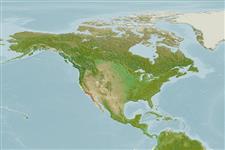Teleostei (teleosts) >
Perciformes/Zoarcoidei (Eelpouts and pricklebacks) >
Stichaeidae (Pricklebacks) > Xiphisterinae
Etymology: carli: Named in honor of Carl Leavitt Hubbs (1894-1979), twice president of the American Society of Ichthyologists and Herpetologists, friend and mentor, who discovered E. carli and E. laurae.
Environment: milieu / climate zone / depth range / distribution range
Ecology
Marine; demersal; depth range 1 - 26 m (Ref. 48788). Subtropical
Eastern Central Pacific: Pacific Grove, California to Bahía San Quintín, Baja California Norte, Mexico.
Size / Weight / Age
Maturity: Lm ? range ? - ? cm
Max length : 17.1 cm SL male/unsexed; (Ref. 48788)
Short description
Identification keys | Morphology | Morphometrics
Dorsal spines (total): 38 - 43; Dorsal soft rays (total): 19 - 23; Anal soft rays: 44 - 49; Vertebrae: 65 - 70. First dorsal spine associated with second pterygiophore; first anal pterygiophore equal in size to second; ventrolateral lateral line connected across breast in an arc that is bisected by a medio ventral lateral line extending from isthmus to fork about anus (Ref. 48788). Caudal fin rounded.
Found on rocky and sandy areas among kelp, in crevices, or kelp holdfasts (Ref. 48788).; subtidal (Ref. 51666).
Life cycle and mating behavior
Maturity | Reproduction | Spawning | Eggs | Fecundity | Larvae
Follett, W.I. and M.E. Anderson, 1990. Esselenia, a new genus of pricklebacks (Teleostei: Stichaeidae), with two new species from California and Baja California Norte. Copeia 1990(1):147-163. (Ref. 48788)
IUCN Red List Status (Ref. 130435: Version 2025-1)
Threat to humans
Harmless
Human uses
Tools
Special reports
Download XML
Internet sources
Estimates based on models
Preferred temperature (Ref.
123201): 12.9 - 23.9, mean 17.8 °C (based on 68 cells).
Phylogenetic diversity index (Ref.
82804): PD
50 = 0.7500 [Uniqueness, from 0.5 = low to 2.0 = high].
Bayesian length-weight: a=0.00389 (0.00180 - 0.00842), b=3.12 (2.94 - 3.30), in cm total length, based on all LWR estimates for this body shape (Ref.
93245).
Trophic level (Ref.
69278): 2.6 ±0.2 se; based on size and trophs of closest relatives
Resilience (Ref.
120179): Medium, minimum population doubling time 1.4 - 4.4 years (Preliminary K or Fecundity.).
Fishing Vulnerability (Ref.
59153): Low vulnerability (11 of 100).
🛈
